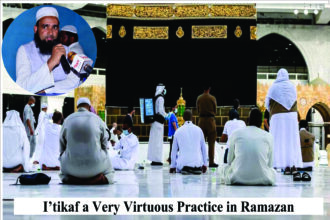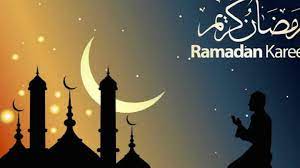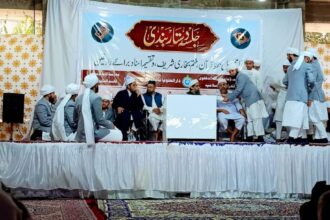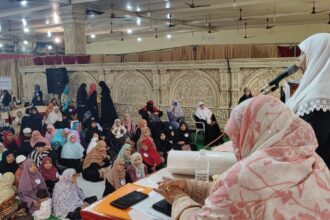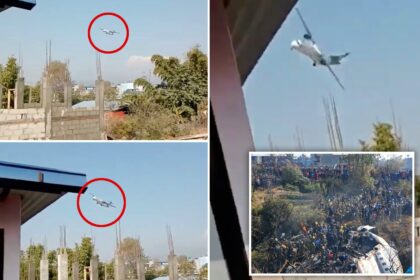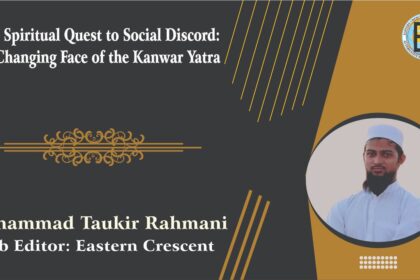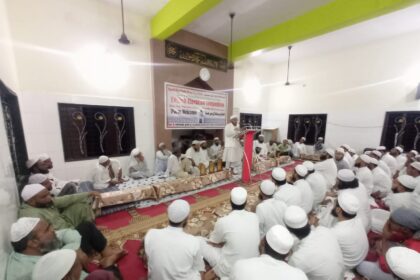By: Mufti Jaseemuddin Qasmi
The writer is lecturer at Markazul Ma’arif Education & Research Centre (MMERC), Mumbai and Co-ordinator Online Darul Ifta
Ramadan is a ninth of Islamic year. This month is highly virtuous and its significance is mentioned in the Holy Quran as Allah says: “The month of Ramadan [is that] in which was revealed the Qur’an, a guidance for the people and clear proofs of guidance and criterion. So whoever sights [the new moon of] the month, let him fast it; and whoever is ill or on a journey – then an equal number of other days. Allah intends for you ease and does not intend for you hardship and [wants] for you to complete the period and to glorify Allah for that [to] which He has guided you; and perhaps you will be grateful.” [Al-Baqrah, 2:185]
The above ayah declares the reasons of the significance. That is, this month is significant because 1. The glorious Quran was revealed in this month, 2. Fasting; one of the pillars of Islam is incumbent in this month.
Allah says at another place in the Quran: “O you who have believed, decreed upon you is fasting as it was decreed upon those before you that you may become righteous.” [Al-Baqrah, 2:183]
This ayah proves that Fasting is obligatory in Islam. So, if someone leaves the fast of Ramadan, then he is regarded as a Fasiq or transgressor. If someone does not believe in its obligation, then he is kafir and goes out of Islam and if someone misses this month’s fast due to some reasonable excuse, he cannot get the virtues which he could get in Ramadan’s fast though he keeps fasting the whole of his life.
In this auspicious month, the reward of good deeds increase seventy times in comparison to any other month, as a hadith reads:
“Whoever draws near to Allah during it (Ramadan) with a single characteristic from the characteristics of (voluntary) goodness, he is like whoever performs an obligatory act in other times.” [Sahih Ibn Khuzaymah, no. 1887]
Ramaḍan an Arabic word is derived from the word Ramad which means that which is intensely or vehemently heated by the sun. Ramaḍān was named such because it burns the sins of the believers. How does Allah burn our sins? One of the main ways in which Allah eradicates and deletes our sins and wrong doings is by multiplying our deeds in the month of Ramaḍan erases our sins because the hasanat (good deeds) eliminates the sayyi’aat (bad deeds). [Surah Hood: 114]
Allah has made fasting of Ramadan and spending its nights in prayer out of faith and in the hope of reward a means of forgiveness of sins. As prophet (saws) says: Abu Huraira reported Allah’s Messenger (saws) as saying: He who observed the fasts of Ramadan with faith and seeking reward (from Allah), all his previous sins would be forgiven, and he who observed prayer on Lailatul- Qadr with faith and seeking reward (from Allah), all his previous sins would be forgiven. [Sahih Muslim 760 a]
It is mustahab in the sense of being strongly recommended in Ramadan to study the Qur’aan together and to read it a great deal. You may study the Qur’an together by reciting it to someone else and by having someone else recite it to you. The evidence that this is mustahab is the fact that Jibreel (al) used to meet the Prophet (saws) every night in Ramadan and study the Qur’an with him. [Muslim, 2308]
Allah’s beloved Apostle (saws) mentioned the virtues of this month in various ahadith as he says: “There is a gate in Paradise called Ar-Raiyan, and those who observe fasts will enter through it on the Day of Resurrection and none except them will enter through it. It will be said, ‘Where are those who used to observe fasts?’ They will get up, and none except they will enter through it. After their entry the gate will be closed and nobody else will enter through it.” [Al-Bukhari]
Etiquettes of Sahr meal
Prophet (saws) said about sahar meal “Take sahar as there is a blessing in it.” He also said: “The difference between our fasts and fasts of the people of the books’ is because of sahar meal. That means they also keep fasts but they do not take sahar meal while it is mustahab (preferable) in our religion.”
- Sahar meal is mustahab and its time is the last part of night. Faqih Abullais says: It is the last sixth part of the night. [Alamgirit, 1/200]
- To take the sahar meal at the last time is mustahab. As a hadith reads:
- Zaid bin Thabit (ra) said, “We took the sahar with the Prophet (saws). Then he stood for the prayer.” I asked, “What was the interval between the sahar and the adhan?” He replied, “The interval was sufficient to recite fifty verses of the Qur’an.” [Al-Bukhari 1921]
- It is makrooh to be eating at sahar or to be so late that the time became doubtful.
- Since sahar is mustahab, so, if any one leaves sahar meal and keeps fast then also his fast will be counted valid though he will be deprived of the blessing of sahar meal.
- If someone is doubtful about sahar time, he should avoid taking sahar meal if he still takes then his fast is okay if it is not confirmed that sahar time had passed away, late it is confirmed that he had taken sahri after the time passed, he will have keep a fast after Ramazan as Qaza.
Etiquettes of breaking the fast
Allah’s Messenger (saws) said about Iftar “The people will remain on the right path as long as they hasten the breaking of the fast.” He further says: “When the night approaches and the day retreats and the sun sinks down, then the observer of the fast should break it.” [Sahih Muslim-1100]
- The time of breaking fast is the time of sunset.
- It is better to hurry to break the fast immediately as iftar time comes.
- If anyone knows with certainty that sun had set still he delays in iftar then it is makrooh (abominable) in Shariah.
- It is mustahab (preferable) to break fast with dates or water.
- If one has had broken the fast thinking that the sun had set while it did not set then he will have to make up for this fast later.
- If some one is doubtful about the sunset then it is not allowed for him to break the fast.
Dua of Iftar
At the time of Iftar Prophet (saws) used to say:
اللّٰھُمَّ لَکَ صُمْتُ وَعَلٰی رِزْقِکَ اَفْطَرْتُ
‘Allhumma laka sumtu wa ala rizqika aftartu’
“O Allah, for Thee I have fasted, and with Thy provision I have broken my fast.”
Prophet (saws) said when he broke his fast:
ذَھَبَ الظَّمَآءُ وَاَبْتَلَّتِ الْعُرُوقُ وَثَبَتَ الْاَجْرُ اِنْ شَاءَ اللَّہُ
“Zahabazamau wab tallatil urooqu wa sabatal ajru in shaAllah”
Thirst has gone, the arteries are moist, and the reward is sure, if Allah wills.”
Due while taking iftar at a friend’s home:
اَفْطَرَ عِنْدَ کُمْ الصَّائِمُوْنَ وَاَکَلَ طَعَامَکُمْ اْلَاَبْرَارُ وَصَلَّتْ عَلَیْکُمُ الْمَلٰئکَةُ۔
The Prophet (saws) came to visit Sa’d bin ‘Ubadah (ra) who presented bread and olive oil to him. The Prophet (saws) ate it and said:
‘Aftara indakum assaimoon wa akalat a’amakum alabrar wa sallatal aikum almalaikatu”
“The observers of fast have broken their fast with you (this is the literal translation, but the meaning is: ‘May Allah reward you for providing a fasting people with food to break their fast’); the pious people have eaten your food and the angels invoked blessings on you.’”
Things that do not break the fast
- The vomit does not break the fast if it comes out itself but if any one knowingly vomits with his own intention then the fast will be invalid.
- If anyone eats or drinks forgetfully then it will not break the fast but if mistakenly, something enters in the stomach for example while doing gargle in the bath if water enters in the stomach, the fast will be invalid. That is why it is recommended in Shariah that one should not do gargle in bath if he keeps fast.
- Applying oil, using kohl or dropping medicine in the eye does not make any difference in the fast.
- To take out blood for medical test does not break the fast. It is allowed if there is any need.
- Injection in vein or in flesh likewise intravenous saline intake does not break the fast if saline is not for just getting energy but used as medicine.
Things that break the fast
- The thing which reaches tummy or brain through natural holes such as mouth, nose, anus, breaks the fast. That is why enema or a drop in the ear if it reaches the stomach or brain, will invalidate the fast. In the same way physical relation with wife also will break the fast.
- If someone’s gums bleed and blood enters in the throat then the fast will be invalid if the blood was equal or more than saliva.
- Sniffing huqqa, beedi and cigarette also invalidates the fast.
- Dropping medicine in the nose will make the fast invalid.
Qaza and Kaffara
Kaffarah is a punishment for those who break the fast of Ramazan knowing without any valid excuse by making sexual relation or eating the things which are consumed in the form of food or medicine that enter the body through the mouth.
- Qaza and Kaffarah are incumbent upon those who break the fast of Ramazan. That means he or she will have to keep 61 fasts; one fast as a substitute of Ramazan’s fast and 60 fasts continuously for kaffarah.
- If kaffarah became compulsory on any one, he will have to keep fasts for two months continuously. If one is not capable to keep fasts for two months constantly, he will have to fully feed 60 poor people two times or feed one poor person 60 days for two times.
- If anyone eats the thing which is not used as food such as pebble, only qaza will be obiligatory upon him and not the kaffarah.
- Kaffarah is only compulsory if any one breaks the fast of Ramazan in the very month. So if any one breaks any other fasts or the qaza fasts of Ramazan then there is no Kaffarah upon him.
- If anyone did iftar considering that the sun had set or took sahar meal considering that the time of sahar is remaining, later he got to know that it did not set or the time of sahar was over then he will have to substitute the fast only not the kaffarah.
- Continuity is necessary in fasts of kaffarah. So, if any one keeps 40 or 50 fasts continuously and leaves one after that then he will have to keep the fast once again for 60 days continuously.
Excuses that allow to leave the fast
The Qur’an commands:
“[Fasting is for] a limited number of days. So, whoever among you is ill or on a journey then an equal number of days [are to be made up]. …”.
- If anyone is suffering from terminal illness and a Muslim pious doctor suggests him or her that fasting will damage his or her health then he/she may leave the fast and if he/she gets cured, he/she will have to keep qaza fast. If there is no expectation that he or she will be able to keep qaza fast then it is wajib (obligatory) upon him/her to pay fidya or to make will for paying fidya before his or her death.
- If any woman is suffering from menstrual cycle or lochia, she is not allowed to keep fast and later she will have to keep qaza fast. But these women should also respect the month of Ramazan and should not eat or drink before those who are having fast.
- If anyone is too old to fast, he or she is allowed to leave fast and pay fidya (One S’a date or half S’a wheat- half Sa is 1 kg 74 g 640 mg) for each fast.
- If anyone is on Shariah journey that is 77.5 km, he is permitted to leave fast and keep Qaza fast later but if there is no problem in journey, as during today’s travels by aeroplane or luxurious train and bus services, then it is better not to leave the fast of Ramazan. Because virtues of Ramazan’s fast once lost cannot be gained later. If the traveler did not keep fast and came at home in the day, he should not eat anything in the rest of the day.
Fasting for health
Intermittent fasting has gotten a lot of attention in recent years. Now, a new study by a team at University of Southern California has looked at how the diet affects a number of health markers in humans over the short term. And verdict is pretty encouraging, at least on its face: Not only is it good for one’s weight, but it seems to benefit other markers of health, including the risk of heart disease, cancer and diabetes. Whether it’s fundamentally better than the old way—keeping at a healthy weight, eating well and exercising—is another question.
To be continued…



